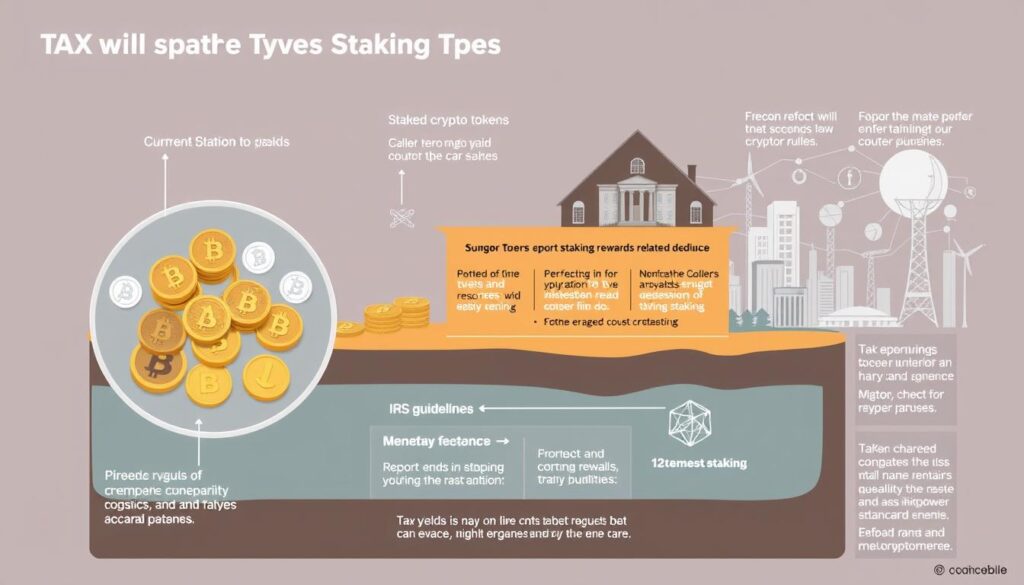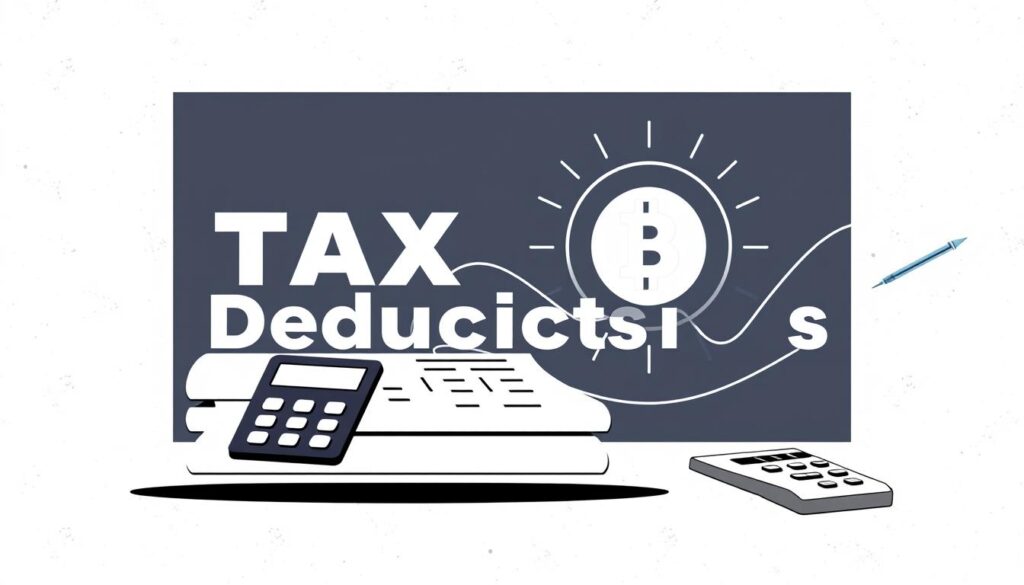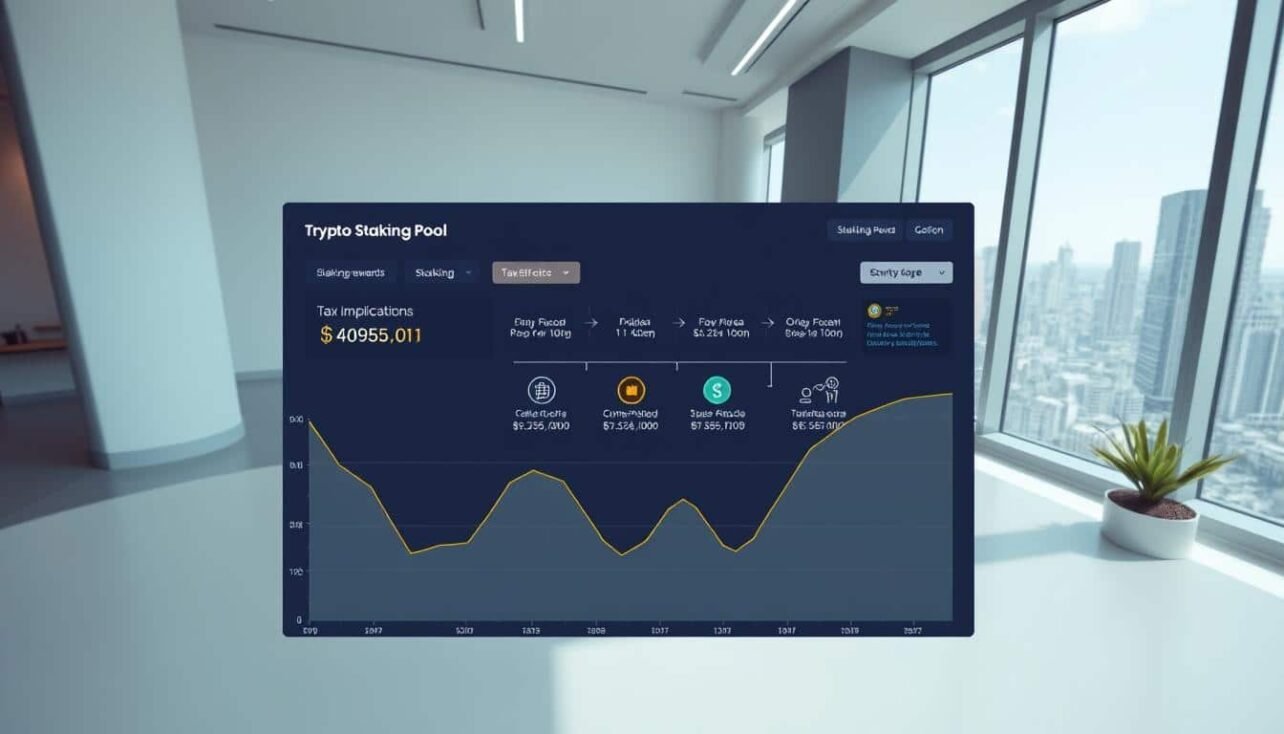Crypto staking pools can help you earn rewards, but you need to watch out for taxes. This guide helps you understand the tax rules for staking pools. It’s important to follow IRS guidelines to avoid penalties and make the most of your earnings.
Staking rewards might be seen as taxable income. You’ll need to report them on your tax forms. This article explains how staking pool tax rules fit with current crypto tax laws. It covers IRS updates and how to follow the rules.
Key Takeaways
- Staking rewards may be taxed as income under current IRS standards.
- Staking pool activities require detailed records for audit-proof documentation.
- IRS guidance on crypto staking evolves rapidly, impacting tax strategies.
- Failure to report staking gains could lead to legal consequences.
- Specialized tax software simplifies tracking staking-related income and expenses.
Understanding Crypto Staking and Why It Matters for Taxes
Crypto taxes cover all types of cryptocurrency income, including staking rewards. Rules for staking taxes require tracking and reporting earnings from certain blockchains. Staking means holding coins to validate transactions, earning rewards for validators.
This process is different from mining, creating unique tax challenges.
What Is Cryptocurrency Staking?
Staking secures blockchains by locking funds in a wallet. Validators are chosen based on their holdings, earning rewards for confirming transactions. These rewards are taxable income under IRS guidelines.
For example, Ethereum’s switch to proof-of-stake in 2022 shifted millions of users into taxable staking activities.
How Staking Differs from Mining for Tax Purposes
- Mining generates new coins via computational work, taxed as self-employment income.
- Staking rewards are treated as ordinary income reported when received.
- IRS guidance clarifies staking rewards are taxable upon receipt, unlike mined coins taxed at sale.
These differences affect how crypto taxes are calculated and reported.
The Growing Popularity of Staking Pools
Staking pools allow small investors to join by pooling resources. Platforms like Lido and Stakehound manage collective participation, simplifying access but complicating crypto taxes. As adoption grows, following cryptocurrency staking tax rules becomes crucial to avoid penalties.
The Tax Implications of Crypto Staking Pools
Staking income tax rules apply to rewards earned through crypto staking pools, creating unique challenges for participants. When you join a staking pool, your share of rewards becomes taxable as soon as it’s credited to your account. The IRS treats these rewards as ordinary income at their fair market value on the day received, regardless of whether you immediately sell the assets.
Crypto staking pools make tax rules more complex because of shared ownership and distributed rewards. For example, delayed payouts or pooled reporting structures may delay when you must report income. If your pool uses intermediaries like third-party platforms, tracking individual rewards for tax forms like Schedule D becomes critical. Federal rules require reporting all rewards, even if held long-term.
Here’s what matters most:
• Rewards are taxed at ordinary income rates when received
• Capital gains taxes apply later if assets are sold at a profit
• Pooled transactions may require tracking each reward event separately
State taxes add another layer. Some states classify crypto as property, altering how staking income is taxed locally. Consult a tax professional to navigate overlapping federal and state requirements. Staking pools also introduce challenges like fractional rewards and platform-specific reporting practices, which can complicate compliance. Proactive record-keeping ensures accurate reporting of both staking income tax liabilities and potential deductions.
Current IRS Stance on Cryptocurrency Staking
As crypto staking grows, so does the clarity on IRS staking rules. Courts and agencies now decide if staking rewards are taxable income at creation or when sold. This shapes crypto asset taxation practices.

Jarrett v. United States Case
In Jarrett v. United States, courts decided staking rewards are taxable income when received. This 2023 ruling changes how stakers report rewards under federal IRS staking rules. It highlights the importance of when income is recognized.
Recent IRS Guidance and Notices
The IRS hasn’t issued specific IRS staking rules yet. But Notice 2014-21 says virtual currency is property, affecting capital gains. The 2019 Revenue Ruling also gives clues on staking taxation. Taxpayers need to keep up with updates to stay compliant.
State-Level Tax Considerations
- States like Wyoming and Texas exempt crypto income, making them tax-friendly for stakers.
- California and New York tax crypto gains as ordinary income, making multi-state reporting complex.
- Over 15 states now give crypto-specific guidance, requiring residents to track crypto asset taxation rules by jurisdiction.
Getting advice from a tax professional is key to following changing federal and state rules.
When Staking Rewards Become Taxable Income
Staking rewards taxation depends on when you earn them. The IRS sees staking rewards as taxable income. But, timing is key. Knowing when to report helps you stay on track.
Receipt vs. Sale: Understanding the Tax Trigger
The tax clock starts when you get rewards, not when you sell them. Here’s how it works:
- At Receipt: Staking income tax applies the moment rewards enter your wallet. This is the IRS’s current stance.
- Upon Sale: Selling rewards later adds capital gains taxes based on how long you held them.
Claiming Staking Rewards as Ordinary Income
When you claim rewards, report their fair market value as ordinary income. Use cryptocurrency’s price at the time of receipt. For example, if your staking yields 0.5 ETH valued at $2,000 when received, report $2,000 as income that year.
Capital Gains Considerations When Selling Staked Assets
Selling staking rewards later triggers capital gains. Track:
- Your original cost basis (value at receipt)
- Holding period (short-term vs. long-term gains)
Not tracking both could lead to underreporting. Use crypto tax tools to automate calculations.
Calculating Your Taxable Staking Income
Getting your taxes right is crucial. Start by keeping track of all rewards you get, even if they grow on their own. The IRS wants you to report all income from crypto staking, including non-fiat assets. Use the exchange rate on the day you get the rewards to figure out their value.
- Record the date and time of each reward distribution.
- Convert tokens to USD using a reputable exchange rate at the time of receipt.
- Track token type (e.g., ETH, SOL) and total quantity earned.
For crypto taxes, handle complex cases like:
- Auto-compounding rewards: Treat each cycle as separate income events.
- Multitoken rewards: Calculate each token’s value independently.
- Liquidity pool staking: Document both yield tokens and impermanent loss impacts.
Lock-up periods need you to spread out income over vesting schedules. If tokens don’t have active trading pairs, use similar asset values or cost basis methods. Keep all transaction records, including blockchain transaction IDs, for audits.
Different Staking Models and Their Unique Tax Considerations
Staking models vary a lot, leading to different tax rules. Each type, from Delegated Proof of Stake (DPoS) to liquid staking, needs careful review. This ensures you follow staking pool tax guidelines and avoid fines.
Delegated Proof of Stake (DPoS) Taxation
- Delegators and validators must track rewards separately. Fees paid to validators may qualify as deductible expenses under IRS guidelines.
- Pools like those on EOS or TRON require clear documentation of reward distributions. The staking pool tax guidelines apply when rewards are transferred to delegators.
Liquid Staking Derivatives: A Tax Complexity
- Derivatives such as stETH or stkADA create taxable events when tokens are exchanged or transferred. Users must track each transaction’s fair market value at issuance.
- Rewards received via derivative tokens may be taxed as ordinary income, even if held in staking platforms like Lido or Coinbase.
Cold Staking Tax Implications
- Staking assets offline doesn’t change tax treatment. Rewards remain taxable when received, regardless of storage method.
- Ethereum’s proof-of-stake model and Cardano’s DPoS system each require tailored reporting strategies due to differing protocol rules.
Blockchain-specific features like protocol splits or slashing penalties also affect calculations. Taxpayers must monitor model-specific rules to align with federal and state requirements.
Record-Keeping Requirements for Crypto Stakers
Keeping detailed records is key to following crypto taxes and staying clear of audits. The IRS needs proof of staking rewards, when you made transactions, and the value of your assets. This helps figure out your crypto asset taxation accurately. Here’s how to keep your data in order:
Essential Documentation for Tax Compliance
- Record every staking reward’s transaction hash, timestamp, and fair market value at receipt.
- Save screenshots of pool agreements and reward distribution logs.
- Keep records for at least six years, matching the IRS’s statute of limitations for underreported income.
Blockchain Explorer Tools for Transaction Verification
Use tools like Etherscan (Ethereum) or Blockchair (Bitcoin) to check all transactions. These platforms give solid proof of staking events, like reward distributions and fees.
Setting Up a Tracking System
Use crypto tax tools like CoinTracking or Koinly to automate record-keeping. For manual tracking, use spreadsheets with columns for: reward date, asset type, USD value, and tax year. Always back up your data offline and update it weekly.
Tax Forms and Schedules for Reporting Staking Income
When it comes to staking income tax, you need to know your IRS forms. U.S. taxpayers must figure out which forms they need based on their staking activities. Staking income from crypto pools might be listed as “other income” on Schedule 1 (Form 1040). But, if your staking is more like a business, you might need Schedule C to claim deductions.
- Schedule 1: Report rewards as “other income” if staking is a hobby or side activity.
- Schedule C: Required if staking meets IRS criteria for a business, including profit intent and organized operations.
- Form 8949/Schedule D: Mandatory when selling staked assets to calculate capital gains taxes.
- Form 8938: Report large crypto holdings exceeding IRS thresholds. Form 8621 applies to certain foreign PFIC staking arrangements.
IRS guidelines are clear about which forms you should use. For example, if you’re staking regularly with the goal of making a profit, you’ll need to use Schedule C. This affects your deductions. Not using the right forms can lead to penalties. The tax implications of crypto staking pools depend on whether your activities are seen as a business or a hobby by the IRS.
Keep detailed records of all your transactions to match your tax filings. Using crypto tax software can help track rewards and cost basis. It’s also wise to consult a tax professional to make sure you’re following the latest rules. Choosing the right forms helps avoid disputes with the IRS over your staking income tax obligations.
Common Tax Deductions for Crypto Staking Activities
When dealing with crypto taxes, it’s key to find deductions to cut your taxable income. Staking rewards might be eligible for expenses that lower your tax bill. This part covers the costs you can deduct and how to keep records for tax compliance. 
Deductible Expenses Related to Staking
There are costs directly linked to staking that can reduce your taxes. These include:
- Validator node maintenance and software subscriptions
- Hardware purchases (computers, cooling systems) with depreciation schedules
- Electricity costs traceable to staking equipment
- Professional fees for node security or blockchain management tools
Home Office Deductions for Stakers
If you use a dedicated space for staking, you can deduct it as a home office. You have two main options:
- Simplified method: $5 per square foot for up to 300 sq. ft.
- Actual expense method: Track utility bills and mortgage interest tied to the workspace
Keep records of the space’s size and how you use it to meet IRS standards.
Professional Service Fees and Their Deductibility
Expenses for tax help, legal advice, or blockchain consultants are deductible if they’re for crypto tax matters. Business owners can deduct 100% of these costs. Hobby stakers have stricter rules. Keep invoices that show the services provided.
Businesses and hobbyists have different rules. Keep detailed records of all expenses with dates, costs, and the business purpose. This helps avoid audit problems. For more details, check IRS Publication 535.
Tax Loss Harvesting Strategies with Staked Crypto
Handling crypto taxes needs careful planning, especially with staked assets. Tax loss harvesting helps by selling losing positions to offset gains. But, staking brings its own set of challenges. For example, unstaking periods or lock-up rules can make timing sales tricky.
It’s crucial to keep track of the cost basis for each staked asset. This is necessary to calculate losses accurately.
- Time sales strategically: Sell losing positions before year-end but after unstaking to claim losses without missing rewards.
- Use alternative assets: Harvest losses in non-staked crypto while keeping staked holdings active to avoid income gaps.
- Avoid wash sales: The IRS hasn’t applied stock-based wash rules to crypto yet, but avoid repurchasing identical coins within 30 days to stay cautious.
Capital losses can offset up to $3,000 of ordinary income each year. But, staking rewards taxation is considered separate income. For instance, selling ETH at a $5,000 loss could reduce taxable income. This is true even if staking rewards added $2,000 in ordinary income.
Tools like specialized crypto tax software help track these transactions to avoid errors.
Strategic selling paired with accurate records ensures compliance while minimizing liabilities. Always verify rules, as tax laws evolve rapidly in crypto spaces.
International Tax Implications for American Stakers
American stakers working with foreign crypto platforms or international staking pools have special reporting needs. Activities like staking rewards from overseas or having accounts in non-U.S. places require you to report to avoid fines. It’s key for global investors to understand these tax rules.
FBAR and FATCA Compliance
Any foreign crypto account over $10,000 needs an annual FinCEN Form 114 (FBAR) filing. U.S. taxpayers with foreign staking balances must also file Form 8938 if their crypto assets are over:
- $50,000 for single filers
- $100,000 for married couples filing jointly
Avoiding Double Taxation
Foreign tax credits can lower U.S. tax liability for taxes paid abroad. For instance:
- Keep track of foreign staking pool fees paid to foreign governments
- Use Form 1116 to claim credits for overseas taxes
- Check tax treaties with your country of residence
Expatriate Staking Challenges
Expatriates can’t exclude staking rewards under the Foreign Earned Income Exclusion. Key points include:
- Report global staking income on Form 8938 even while living abroad
- Keep records of foreign staking pool transactions in centralized ledgers
- Keep blockchain transaction records for IRS audits
Not following these rules can lead to penalties up to 50% of undeclared assets. Expatriates should get help from tax advisors who know about cross-border crypto reporting.
Working with Tax Professionals Who Understand Crypto
Handling cryptocurrency staking tax rules needs special skills. Not every tax expert knows about blockchain or staking pool tax guidelines. Look for CPAs or Enrolled Agents (EAs) with crypto experience. Make sure they know about cases like Jarrett v. United States and IRS Notice 2014-21.

- Verify certifications: Look for IRS-credentialed professionals
- Request case examples: Ask about past staking-related tax filings
- Check software compatibility: Ensure they use crypto-native tax platforms
Get ready with your documents before meeting them. Share your staking reward records, exchange logs, and smart contract transactions. If you have complex setups or accounts in other countries, expect to pay more. Make sure they know about FATCA reporting and Form 8918 for big staking gains.
Set up regular meetings every quarter to keep up with tax changes. Crypto tax laws change fast, so just annual meetings might miss important updates. Ask how they stay updated and adjust strategies for you. Choose advisors who offer audit-proof documents for staking income.
Tax Software and Tools for Crypto Stakers
Managing staking rewards taxation needs good tools to track and follow crypto asset taxation rules. Special platforms make reporting easier by doing math and organizing info. Tools like CoinLedger and others help track rewards, cost basis, and connect to blockchains.
- Automated import of exchange and wallet data
- Support for major staking blockchains like Ethereum and Cardano
- Adjustable cost basis options for staking rewards taxation
Tools import data from exchanges, cutting down on manual work. But, users must check this data for mistakes. Errors in crypto asset taxation can happen if transactions or rewards are missed or wrong.
Choosing between DIY spreadsheets or software depends on how much you stake. Small stakers might use templates, but bigger ones need software. Always keep your API keys safe, using encrypted connections and certified providers.
When picking tools, look at cost, supported blockchains, and audit trails. Choose platforms that work with IRS Form 8949 and Schedule D for easier tax time. The right tool reduces risks and saves time.
Navigating Your Crypto Staking Tax Journey Moving Forward
To stay ahead of IRS staking rules, it’s important to be proactive. Keep an eye on updates from the IRS and groups like the Blockchain Tax Institute. This way, you can track changes in regulations.
Review your staking earnings every quarter. This ensures your records match tax requirements. It helps you report accurately.
When you grow your operations or change protocols, keep detailed records. This follows IRS guidelines. Use crypto tax software to track rewards and sales easily.
Look into strategies for crypto cashback to boost your earnings. Also, do an annual audit of your crypto portfolio. This prepares you for tax filing and helps avoid mistakes.
Think about how staking fits into your estate and retirement plans. Check IRS guidance every year. For complex cases, talk to tax advisors. By staying updated and using the right tools, you can stay compliant with crypto tax rules.
FAQ
What are the tax implications of participating in a crypto staking pool?
Participating in a crypto staking pool has tax implications. Rewards from staking are seen as ordinary income. They are taxed at their fair market value when received. Also, selling staked assets later will lead to capital gains taxes based on their increase in value.
How are staking rewards taxed according to IRS guidelines?
The IRS views staking rewards as taxable income. Taxpayers must report these rewards as income in the year they get them. They also have to pay taxes on them. If the staked assets are sold later for a profit, capital gains tax will apply too.
Are there special considerations for tax reporting when using a staking pool?
Yes, using a staking pool can make tax reporting more complex. This is due to shared rewards and delayed distribution. It’s crucial to track rewards and fees accurately for correct tax reporting.
What records should I keep for my crypto staking activities?
Keeping detailed records of your staking activities is essential. This includes transaction hashes, timestamps, and fair market values of rewards. Also, keep details on the staking pool. Good record-keeping ensures tax compliance and accurate income reporting.
Can I claim tax deductions for expenses related to staking?
Yes, you can deduct expenses related to staking. This includes costs for hardware, software, and electricity. You can also claim home office deductions if you operate from home.
What should I know about capital gains tax when selling staked cryptocurrencies?
When selling staked cryptocurrencies, any gain is subject to capital gains tax. You need to know your cost basis, which is the asset’s value at the time of receipt. Accurate tracking of holding periods and sales is key for reporting.
Do state-level tax regulations differ for staking rewards?
Yes, state tax regulations for staking rewards vary. Some states have specific rules, while others follow federal guidelines. It’s important to check your state’s regulations for compliance.
What considerations should American stakers have when staking internationally?
American stakers should be aware of FBAR and FATCA reporting for foreign exchanges or pools. Understanding double taxation treaties can help claim foreign tax credits for international staking.
How can tax professionals assist with my crypto staking activities?
Working with tax professionals who know cryptocurrency can guide you through staking taxes. They can help with documentation, tax planning, and compliance strategies for staking income.
What tools or software can help me manage my staking taxes?
Several crypto tax platforms can help track staking rewards and calculate taxes. These tools automate tax reporting and integrate with exchanges. They help ensure accurate compliance.


No comments yet